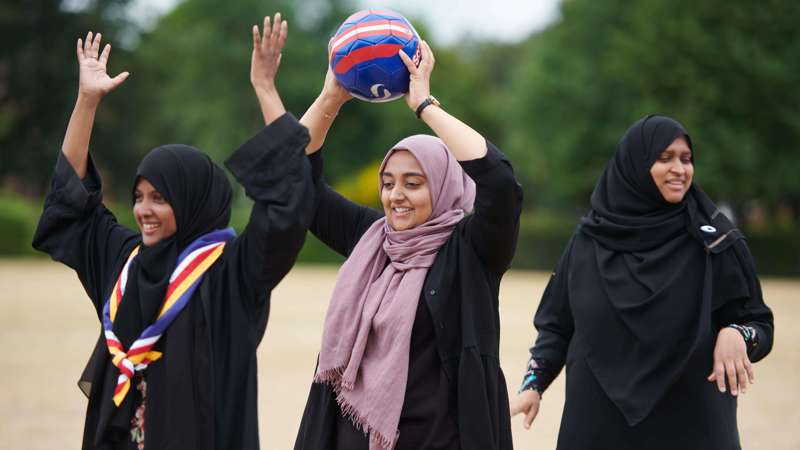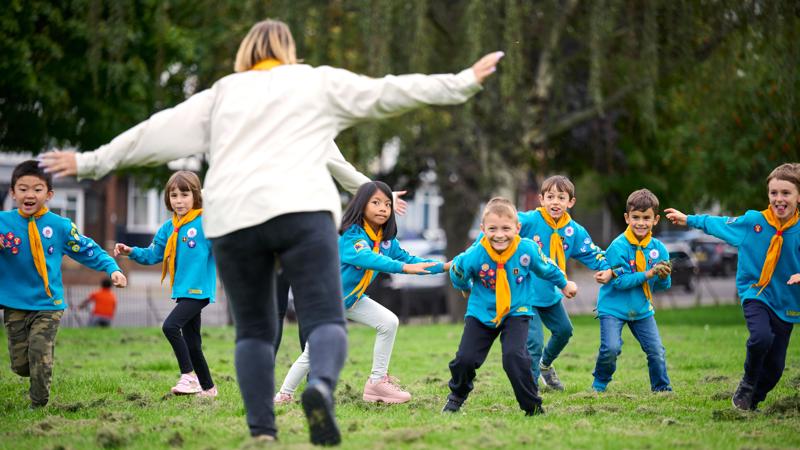Volunteer roles
Discover the roles that’ll exist in our new volunteering framework and descriptions of what they'll do
This information should support what is being shared in local briefings and meetings with your local Transformation Leads and Leadership Teams. Work with your Transformation Leads to plan how and when you will make these changes locally.
Volunteer roles
At Scouts, we're changing from a complex system of over 400 volunteer roles to a new simpler approach.
We're moving to teams-based volunteering, which means clearer roles and responsibilities for everyone. Most volunteer roles (and their purpose and tasks) can be found on team descriptions and what leading a team means.
We also have some additional roles. Some of these may already exist, but as we’re making significant changes to how we volunteer together, and we’ll be introducing new digital systems, the purpose and tasks associated with these roles may change.
Don't worry, you don’t need to have every role filled. Just keep these positions in mind as you're making changes to your teams. The important things are to make sure new volunteers understand their role, and to help existing volunteers grasp how their role will change under our new approach.
Volunteer roles found in all Sections, Groups, Districts and Counties:
- Lead Volunteer
- Team Leader
- Team Member
- Chair
- Treasurer
- Trustee
For details, please read the Team descriptions and What leading a team means.
Some volunteers might focus on particular tasks within the team descriptions, and they could be part of a sub-team or they might have an accreditation.
Teams in Regions, Nations and HQ operate on the same principles as these teams, however the details are slightly different.
Additional volunteer role descriptions:
Purpose:
Our Youth Leads make sure Scouts is shaped by young people aged 4-25. They champion, encourage and lead work in their area, supporting volunteers to empower young people and embed their ideas and decisions into Scouts locally.
Youth Leads play a key role in the leadership and management of their District, County, or Area.
Tasks:
Develop young people aged 4-25 within Scouts
- Make sure young people have regular opportunities to take the lead, such as promoting peer leadership and the Young Leaders’ Scheme.
- Inspire and motivate young people. Make sure they know about the opportunities available to them in Scouts, including options when they turn 18.
- Champion and encourage participation in the YouShape award and other top awards.
Embed young people aged 4-25 in decision-making locally.
- Support and encourage volunteers to put the views and ideas of young people at the core of programmes.
- Make sure young people are at the heart of Trustee Board decisions.
- Create opportunities for young people to provide feedback.
Work with other volunteers
- Work with other Youth Leads and wider volunteers in Leadership Teams, Programme Teams, Volunteering Development Teams, Support Teams, and Section Teams to support each other, share ideas, and work towards a shared vision.
Who can have this role:
A Youth Lead can start the role between their 18th and 25th birthdays.
What learning is needed:
- Complete Growing Roots within the first 6 months in the role, including both Core and Manager learning.
- Trustee Induction
- Complete First Aid training within the previous 3 years.
Who can appoint this role:
District / County (or equivalent) / Region / Nations / UKHQ Lead Volunteers
Purpose:
Our Designated Carers are someone who, outside of Scouts, provides care for an individual young person. Most commonly, this will be the young person’s parent, foster carer, legal guardian or a care professional.
Tasks:
- Follow the Intimate and Personal Care Policy and Procedures.
- Carry out intimate or personal care of a specific young person during their time within Scouts, as an extension of their professional or parental care experience.
- Act within their skill set to provide the care set out in the Individual Support Plan.
- Only provide care if they are named in the Individual Support Plan, which has been agreed and signed by all involved in the provision of care (as indicated in that plan).
- Work with other volunteers (including Section Team Leaders, Team Members and Nominated Persons) to make appropriate adjustments and support wider learning if needed.
Who can have this role:
- A person who, outside of Scouts, provides care for an individual young person. Most commonly this will be the young person’s parent, foster carer, legal guardian or a care professional.
- Existing experienced professionals who could include medical professionals, education professionals and social care professionals.
- We also recognise individuals may have gained experience in providing care for young people with additional needs in other areas, beyond professional qualifications. See Guidance for Appointments.
What learning is needed:
- Read and understand Scouts’ Intimate and Personal Care Policy and Procedures. It’s paramount all adults involved in Scouts are compliant with this policy and follow the agreed Individual Support Plan.
- Read and understand our Yellow Card Code of Conduct for Volunteers.
Specific personal care training isn’t required if the person supplying the care is the carer outside of Scouts and named as the Designated Carer on the Individual Support Plan.
Who can appoint this role:
- Group Lead Volunteers
- 14-24 Team Leaders
Purpose:
Our Transformation Leads drive our 2018-2025 Skills for Life Strategy forward and lead on implementing change locally. They prepare and support their local area as it embraces and achieves positive change that helps more young people gain Skills for Life.
Tasks:
- Understand Scouts’ 4 Steps of Change.
- Collaborate with UKHQ to understand changes and provide feedback.
- Translate ‘big picture’ plans, helping to make them work in a local context.
- Help to plan, champion, and lead change delivery locally.
- Work with a variety of people, such as County and District Lead Volunteers and their teams (including Groups), National and Regional volunteers (where relevant), UKHQ staff and Programme volunteers.
- Engage local volunteers to communicate changes.
- Prepare and support volunteers to understand, embrace and adopt changes.
- Make sure changes are embedded for the long term.
Who can have this role:
- Ideally, Transformation Leads will have led change before, in a volunteer or professional capacity.
- They should have excellent communication skills, work well with others, and be flexible.
What learning is needed:
Growing Roots
Who can appoint this role:
County (or equivalent) / Region / Nations / UKHQ Lead Volunteers
Purpose:
Our Presidents / Vice Presidents promote the perception of Scouts in the wider community.
Tasks:
- Work to encourage the positive perception of Scouts in the community.
- Help foster relationships between Scouts and other key organisations and institutions, further connecting Scouts with the local community.
- Attend events.
Where Presidents / Vice Presidents attend Scouts events they must be chaperoned by any full member (except Trustees and roles that do not have a criminal records check).
Who can have this role:
This is an honorary role. It does not automatically make them a member of a team or a Trustee Board.
What learning is needed:
None
Who can appoint this role:
Scout Council

Understanding volunteer teams, including who's in them, and what each team's purpose and responsibilities are.

Discover the tasks and responsibilities given to Team Leaders and Lead Volunteers.

Find out how tasks and responsibilities can be shared and delegated through accreditations.